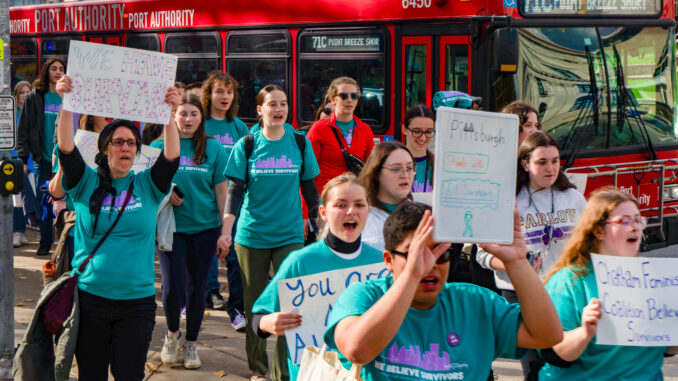
Eliyahu Gasson | Staff Writer
University students and faculty wearing blue and purple t-shirts took to Oakland’s streets on Sunday as a show of support for survivors of sexual violence during the third annual “Pittsburgh Universities Believe Survivors March”.
The event, hosted by Carlow University, Carnegie Mellon, Chatham, Duquesne and the University of Pittsburgh, began at 11:00 a.m. in Carlow’s University Commons building. Attendees were encouraged to make signs with uplifting messages and learn about some of the resources available to individuals experiencing or recovering from sexual violence.
After the event began, participants were asked to move outside to listen to a collection of guest speakers.
One of the speakers, Nicole Molinaro, is the president and CEO of Women’s Center and Shelter of Greater Pittsburgh – the local domestic violence program that serves about 7,500 survivors each year.
“We all need to take action. This is not a problem that is going away just from acknowledging it,” Molinaro said to the Duke. “We all have to take action in big and small ways to make sure that our community is able to combat it.”
Following the first set of guest speakers, the group descended from Carlow’s hilltop campus down to Pitt’s Cathedral of Learning where they stopped for pictures. They then carried on to the William Pitt Union Patio where they were greeted by a selection of snacks, water and some hot beverages.
Participants were given time to engage with some more tables from organizations providing resources for survivors of sexual violence.
One of the presenters was Rachel Turkington, a student at the University of Pittsburgh. Turkington represents the University of Pittsburgh organization, Safe at Pitt, which encourages reporting and provides education on sexual assault.
“I think the message of the whole day was just how important it is to believe survivors and that Pitt and other universities in Pittsburgh need to be doing more to reduce sexual violence on our campuses and reduce stigma,” Turkington said.
As marchers settled on the William Pitt Union patio, they were introduced to Dev Hay0stek, the lead prevention educator at the University of Pittsburgh Office for Equity, Diversity and Inclusion.
Hayostek shared their story in a speech about healing after a traumatic sexual experience and how, despite seeming like their life had ended, they were able to heal.
“To have your body taken in some way without your consent is the ultimate betrayal, and nothing I say will ever change that being a survivor shapes who we are,” Hayostek said. “We can’t let them win. We can close ourselves off to beauty and magic and the love in the world, or we can choose to try one step at a time.”
The march did not go without some heckling. While most drivers passing by honked their horns in support, one passenger shouted from a car calling the crowd “losers” before backtracking his remark with “just kidding.”
Lance Edwards, a graduate student at Carlow and participant in the march, thought that while the heckler was just joking, the incident was indicative of an issue that the group was trying to combat.
“I don’t understand why… they were calling us losers,” Edwards said. “In reality, we are standing with the people that are victims. We are standing with people that have to go through situations that [I] personally have never been through. For them, the survivors – people that are simply going through this situation – to be called losers is ridiculous.”
Edwards hopes that the march encourages more people to stand up for survivors and against sexual violence.
“That’s the biggest thing that we want–to encourage people to stand up for what we believe in.”
Edwards stressed that the key to ending sexual violence is love and support.
“We have to get back to loving each other, get back to encouraging the survivors to speak up and to stand along with them.”
Ryan Sabolcik, Title IX Sexual Misconduct Prevention and Response Assistant for Duquesne University, said at the event that students who think they need help or advice related to sexual violence should not hesitate to reach out to their Title IX office.
“They [students] see Title IX as somewhere to report versus somewhere to get resources, support and connection to other places,” Sabolcik said. “I really want students to know that the staff is here for you.”

